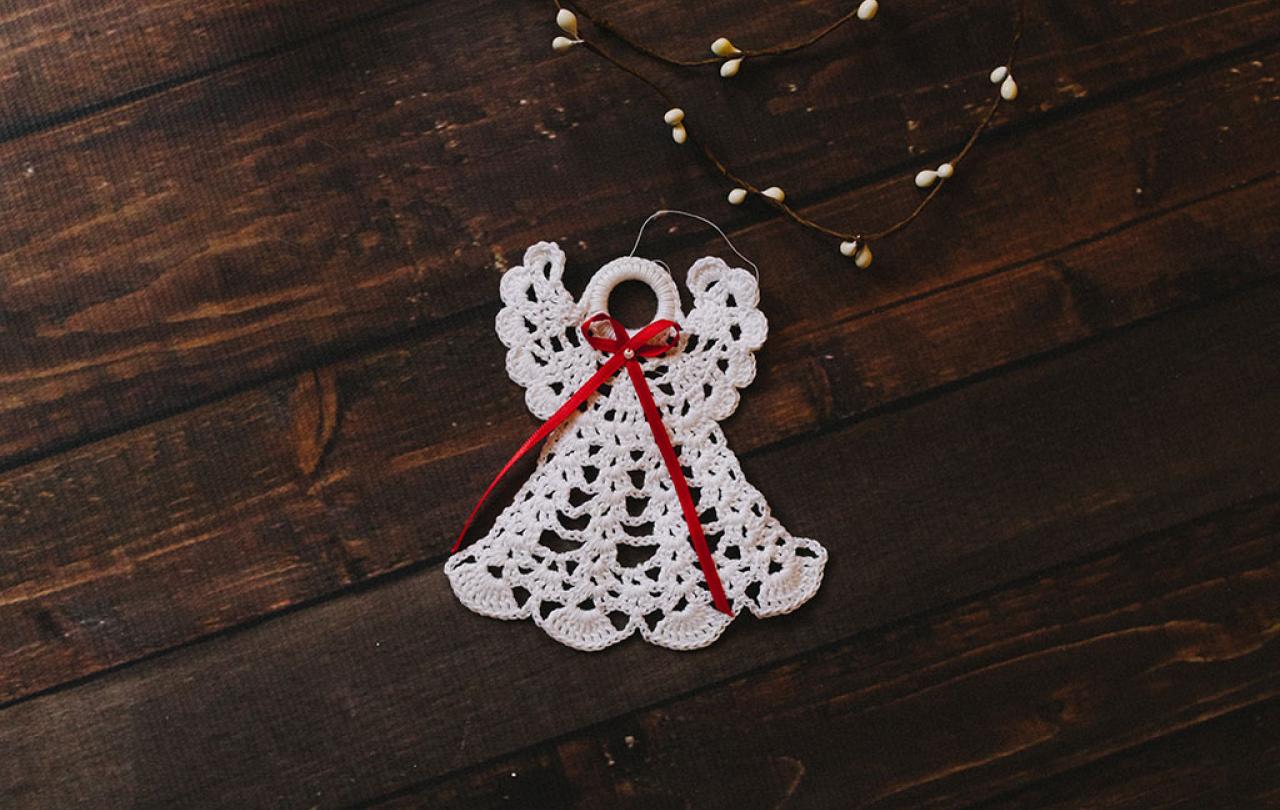
Childhood Christmas was for me a time of craft and productivity, of baking and decorating, of paper chains and printing cards with dissected potatoes. Christmas was all about making, so homemade presents outshone everything else.
That was fine if you were a painter, knitter, sculptor, seamstress, or woodworker, and each member of my family was at least one of those things. I was the odd one out: at least until the autumn before last, when I took up crochet.
My inspiration came from John Milbank: theologian, philosopher, political theorist, poet, and general ruffler of feathers. Not, I have to say, because he sets example with hook and yarn. Rather, he’d written an essay, an essay that spoke to me, as someone often in art galleries but rarely making. We get so invested in fine art, he wrote, that we forget the priority of applied art, of craft and decoration. That’s the foundation. The art we go to see in museums is great only if it succeeds in ‘intensifying this art which is proper to humanity as such.’ So, I took up crochet.
Crochet, as I hoped, is rather like playing the recorder. It’s not too difficult, even at the beginning, but has plenty of scope for complexity and skill. I’m now three blankets in, plus six cushion covers and a hat. Even my first efforts were gratefully received as presents, and I some of my recent work is much more intricate, and not half bad.
I’ve finally joined the ‘Christmas is about making’ project: and Christmas really is about making. John Donne put it like this, addressing the Virgin Mary:
… yea thou art now
Thy Maker’s maker, and thy Father’s mother;
Thou hast light in dark, and shutst in little room,
Immensity cloistered in thy dear womb.
Mary becomes her ‘Maker’s maker’. In a further twist, which Donne would appreciate, Mary’s child grew up to be a carpenter, or – as the Greek would better be translated – an all-round, general purpose village maker: from hearths to homes, from shelves to structures.
In thinking about how God took up a human life, writers have often turned to the language of making. In the same poem, Donne has God weaving himself a kind of garment in Mary’s womb: ‘He will wear, / Taken from thence, flesh’. Thomas Pestel (1586–1667) opens an unjustly forgotten Christmas hymn like this:
Behold, the great Creator makes
Himself a house of clay,
a robe of virgin flesh He takes
which He will wear for aye.
More familiar still is Charles Wesley’s ‘Hark the Herald Angels Sing’, with its lines:
‘Veiled in flesh the Godhead see, / Hail the incarnate Deity!’
The language of wearing, of robes and veils, hasn’t always fared well among theologians. I heard of one stern tutor in doctrine who would look round the chapel whenever Wesley’s carol was sung, reserving a stern word for any student who failed to fall silent at that line. He didn’t like the implication that God was merely draped in humanity, making only an outward show of being human.
Thomas Aquinas saw that worry, writing in the thirteenth century, but argued for charity. The language of clothing isn’t perfect, but we shouldn’t expect it to be. Illustrations gesture towards the truth, they aren’t identical with it, and all the more when we’re talking about God. As long as we don’t think expect the clothing image to say all that needs to be said, there’s mileage to it. For one thing, clothing can make someone visible (as the late Queen knew very well): ‘veiled in flesh, the Godhead see’. Moreover, Christ’s humanity was shaped by his divinity, like a garment is shaped by the body of the one who wears it, yet the body remains unchanged (and so does the garment), just as God became human without becoming any less divine.
Alongside clothing, Pestel also suggested God working with clay:
‘Behold, the great Creator makes / Himself a house of clay’.
That takes up, and reworks, another textile image. John’s Gospel gets to the heart of the Christmas message with a line so solemn that Christians have been accustomed to drop to their right knee on hearing it read: ‘And the Word was made flesh, and dwelt among us’. That’s how we know it, but a more accurate translation is that the Divine Word ‘pitched his tent among us’. The houses that Pestel knew, however, were made of bricks not cloth, which is to say of clay, so he adapted the image. Or, just as likely, with that clay, he had the ‘house’ of the human body in mind. That would recall lines in Genesis, where God makes Adam out of clay, or ‘the dust of the ground’. In fact, the Hebrew word ‘Adam’ means just that – something like ‘earthling’ – just as ‘human’ is related to the Latin ‘humus’, meaning soil.
Whether weaving and wearing, or building, or sculpting, or potato printing, this is the message to stop us in our tracks at Christmas: that the Maker made himself human. There is something beautiful that we greet that with homemade presents, with printing cards, with decorating and baking, with craft and productivity, with paint and cloth, paper, wood, and yarn, and with that sublime sort of making that is music. As Pestel puts it, in closing ‘Behold, the great Creator makes’
Join then, all hearts that are not stone,
and all our voices prove,
to celebrate this holy One,
the God of peace and love.





